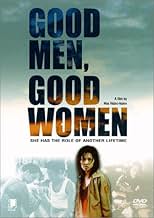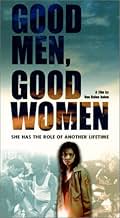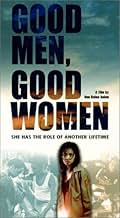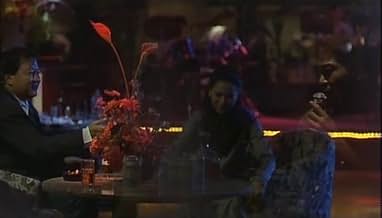Añade un argumento en tu idiomaIntended as the concluding film in the trilogy on the modern history of Taiwan began with Beiqing Chengshi (1989), this film reveals the story through three levels: a film within a film as w... Leer todoIntended as the concluding film in the trilogy on the modern history of Taiwan began with Beiqing Chengshi (1989), this film reveals the story through three levels: a film within a film as well as the past and present as linked by a young woman, Liang Ching. She is being persecut... Leer todoIntended as the concluding film in the trilogy on the modern history of Taiwan began with Beiqing Chengshi (1989), this film reveals the story through three levels: a film within a film as well as the past and present as linked by a young woman, Liang Ching. She is being persecuted by an anonymous man who calls her repeatedly but does not speak. He has stolen her diar... Leer todo
- Dirección
- Guión
- Reparto principal
- Premios
- 11 premios y 5 nominaciones en total
Reseñas destacadas
So Zhang can do intense drama, and Wong can direct spontaneous acting. Hou Hsiou Hsien (or his colleagues Tsai Ming Liang and Edward Yang), however, is of a different breed. His films (that I've seen anyway) are casual but deliberately never ever strive to be interesting. For example, there's no moody music, showy cinematography, or thought-provoking dialogue to spice things up while you watch a 2-minute long take of people walking. Everything is just as indifferent as it is and nothing more; then it's up to us to give it a meaning -- that is the essence of MINIMALISM which define Hou's body of work. Minimalist cinema is by far the most difficult to grasp and sit through (since "nothing happens," some will understandably accuse), and many viewers detest it with a passion. Whether this style is actually effective I do not know, "all I know is this: once I was blind and now I can see." Good Men Good Women is an eye opener for me.
In recent years, several well-noted Chinese art house filmmakers have upgraded to generously budgeted blockbusters: Ang Lee with Crouching Tiger, Zhang Yimou with Hero and Flying Dagger, He Ping with Warriors of Heaven & Earth, Fruit Chan with Three Extremes: Dumpling, not to forget Cheng Kaige's special effects fantasy extravaganza The Promise on the way, followed by Wong Kar Wai reportedly to film an American feature The Lady from Shanghai with Nicole Kidman, and words of Hou's Taiwanese colleague Edward Yang to direct an animation produced by Jackie Chan. In such a relaxing trend, will Hou Hsiou Hsien have any surprises for us, or will he continue to explore Taiwan in minimalist glory?
Hou's style is subtle, an excellent cinematographer and picture taker, like many of the Asian films (whether this is from a common thread or by accident I don't know). He is not as overtly stylish as Wong Kar-Wai, but the shots he takes and chooses (perhaps the better adjective) are beautiful.
A previous commentator called this style "cinematic masturbation", which I think is an adolescent argument. Just because the points don't hit you over the head doesn't mean they are not being made. This is a political film, dealing with a still sensitive topic. The director definitely cares about the audience. Like anything else, it's the little details that count.
One of those little details is an Ozu film being played on TV in one background shot. Hou has consciously acknowledged Ozu as an influence and his style shows it. The action, so to speak, takes place within the context of the everyday events. The points being made are observed by the routine actions, and unique touches within them.
The most solid point being the commonality of loss, and tragedy between two Taiwanese actresses of different generations. Both lose lovers, and sacrifice children to the events around them.
The other point is the simultaneous affluence and emptiness is modern day life. The actress in the older story is based on a real person, who joined the anti-Japanese resistance in China during WWII. After this, her husband is executed in an anti-communist crackdown in Taiwan. She is both pushed along by events, but shows a determination to live her life and make decisions, This is in contrast to the other story, that of the actress playing (there is a movie within a movie), who is looking back on a life with petty gangsters, drinking and drugs. In material goods she is richer than the older actress ever was, with her upper middle class life, yet poorer in far more many ways. Both are played by the same actress, who handles the two stories well.
In the Hou portfolio, I prefer this to Goodbye South Goodbye, which I felt got a little lost in fancy camera work, but I feel that this is close to Flowers of Shanghai.
What is also clear (though the Fox Lorber DVD tonal quality is mediocre, particularly in the black and while segments) is the idealism of the Taiwanese nationalist fighters, who go to China to fight the Japanese who have been oppressing them but then after the war is over, are systematically exterminated (in a policy designed to please America, by the way). Some of these scenes, such as one where one person after another is briefly interrogated, have an arresting and somehow heartrendingly tender vérité quality, as does the scene where female fighters are taken from a prison room to be executed. There is a wealth of beauty in the film, even when the present-day sequences seem most contrived and boring, like a gangster dinner with city contractors just before Ah Wei's shot.
It is also true as Acquerello says that, "As Liang becomes the entrusted emissary for the story of Chiang Bi-Yu's struggle, she gradually becomes the generational conduit between Taiwan's turbulent past, and the decadent, uncertain future." That's about all we can say; what Hou means by this linkage is hard to guess, and perhaps only meant to be pondered, without any conclusions being drawn.
Howard Shumann has written a typically clear and informative review of "Good Men, Good Women" for Cinescene that clarifies the general structure and historical references of the film. My own reactions are quite different, however. I wouldn't be as extreme as the IMDb commenter who has called Hou's film-making "cinematic masturbation," or use the language of Sam Adams of the Philadelphia City Paper (2002) who calls "Good Men, Good Women" "a confused exercise" and suggests it's self-indulgent. But I have to agree with Adams that, "Good Men feels so arbitrary that its closing-title dedication to the victims of the anti-Communist purges of the 1950s is almost shocking; it's hard to believe the director could take a subject that seriously and make a film this self-indulgent." The shifts from the present-day actress's discomfort and her flashbacks to life with Ah Wei to the historical film-making never seem predictable. Some might find that intriguing; to me is merely seems arbitrary and random.
"Good Men, Good Women" is far more multi-layered and ambitious than a purely present-day musing like "Millennium Mambo" (despite the latter's tacked-on comment that the voice-over occurs ten years later). But the randomness of the splicings makes the implied relationship questionable, even frivolous. Hou may be better off separating his historical treatments from his modern ones, as he does quite simply with three segments in his recent "Three Times."
Take Good Men, Good Women. It's not a bad movie, really. Certainly not Hou's worst. Its main claim to greatness is its excellent cinematography, with some sections in a high-contrast black and white and others in brilliant color. Hou also decides to move his camera a bit and film from different angles. He's finally caught up with D.W. Griffith, although he still falls back on his favorite compositions again and again. The narrative is often great - there are several great individual scenes - but it's ultimately too difficult to follow, which is the exact same complaint I had of my (currently) favorite Hou film, City of Sadness. The plot of Good Men, Good Women revolves around the life of a famous Taiwanese actress (a real person; the film is dedicated to her) and, in the more modern section of the film, an actress who is apparently going to play this former actress in a film about her life (her story is broken into two different time periods). This made sense after I read up on it, but it was really confusing when I was watching it. I assume the same actress played both parts. It's confusing because Hou doesn't want to stress anything: characters are introduced with their backs to us or when they're in shadows. How does he really expect us to recognize and latch onto his characters? He just doesn't care. No, that's not it. It's that he doesn't want us to do so: some pretentious notion that a confusing movie is an artistic one.
If I were to see this film again, I might find it better. It's still cinematic masturbation. If the audience, after reading up on it or seeing it several times, then understands it, well, it only becomes mutual masturbation. Satisfying, but wouldn't you much rather be f*cking?
¿Sabías que...?
- ConexionesFeatures Primavera tardía (1949)
Selecciones populares
Detalles
- Fecha de lanzamiento
- Países de origen
- Idiomas
- Títulos en diferentes países
- Good Men, Good Women
- Localizaciones del rodaje
- Empresas productoras
- Ver más compañías en los créditos en IMDbPro
- Duración
- 1h 48min(108 min)
- Color
- Mezcla de sonido
- Relación de aspecto
- 1.78 : 1









